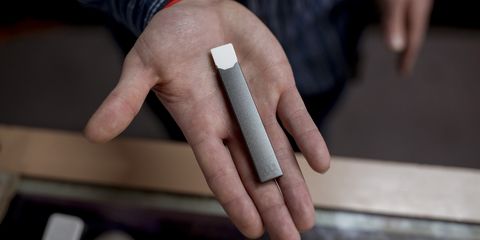
Teen vaping (and juuling) has reached “epidemic proportions,” according to The Food and Drug Administration (FDA)—and now the agency has big plans to end that.
FDA commissioner Scott Gottlieb announced on Wednesday that he’s going after retailers who allegedly sell e-cigarettes to minors, according to an FDA news release. He also warned companies that the FDA may try to ban flavored e-cigarette liquids. “We cannot allow a whole new generation to become addicted to nicotine,” said Gottlieb.
What is Juuling exactly?
Juuls are a type of vaporizer or e-cigarette, designed so discreetly that most people don’t even recognize them as an e-cig. Juul devices (and other vaporizers) work by heating up a cartridge that contains oils and make a vapor that can be inhaled.
View this post on Instagram
A post shared by Serving since 2014 ?? (@vapestore.co.in) on
According to the company’s website, they were designed to help cigarette smokers transition off of smoking. “We envision a world where fewer people use cigarettes, and where people who smoke cigarettes have the tools to reduce or eliminate their consumption entirely, should they so desire,” the website says. It also says in its marketing and social media code that Juul products are “not appropriate or intended for youth.”
However, the vaporizers are small enough to fit in the palm of your hand, and they can be charged when plugged into a laptop’s USB slot—making it easy for students to pass them off as flash drives in class.
Between those two design elements, and the fact that the Juul pods come in flavors like crème brulee, cool cucumber, and mango, these e-cigs have become insanely popular with kids.
Is Juuling really that popular?
In short: yes. The Juul vaping device was invented by two Stanford grads in 2007, and has since become the best-selling e-cigarette on the market, capturing 32 percent of the market share, according to Nielsen data. And according to not-yet published data from the FDA, there was a 75 percent increase in overall e-cigarette use (vaping and juuling) among high schoolers this year compared to last year, per the Washington Post.

In addition to convenience stores, Juul products are sold through their website where you need to verify that you are at least 21 years old by providing your date of birth, legal name, and permanent address, which are then checked against public records, before you can purchase.
However, one Boston doctor told WFXT that teenagers are still buying Juuls online by lying about their age and using a prepaid debit card.
Okay, but are Juuls really that bad?
Many people use e-cigarettes, like Juuls, because they aren’t made with tar and all the cancer-causing chemicals you’ll find in a tobacco cigarette. Still, a 2018 study published in the journal Pediatrics found that teenagers who smoked e-cigarettes had higher levels of cancer-causing chemicals in their bodies than non-smokers.
“This is not a safe alternative,” says Michael Blaiss, M.D., the executive medical director of the American College of Allergy, Asthma and Immunology. “Is it safer than a tobacco cigarette? Yes. The problem is that nicotine itself can have major effects.”
When it comes to nicotine levels, one Juul pod contains the same amount of nicotine as a pack of cigarettes, according to the company’s website.

“Nicotine is extremely addictive and it can act as a neurotoxin and alter brain chemistry so the brain doesn’t function normally without it. This can be especially harmful for teenagers whose brains are still developing,” says Carol Southard, R.N., tobacco treatment specialist at Northwestern Memorial Hospital. “More importantly, nicotine is a gateway drug. Teenagers who begin with e-cigarettes are more likely to transition to combustible cigarettes, putting them at higher risk for health issues.”
Both Blaiss and Southard hope parents and lawmakers will soon catch on to this dangerous trend. “Tobacco companies are getting savvier with marketing these vape products to teens,” Southard says. “Parents need to know what to look for and understand the dangers they could cause to teenager’s health.”
Some teens are even fighting Juuling.
Cigarettes—not okay. But for teens, “it’s ‘cool’ to Juul,” said Jack Waxman, 17, the producer of a viral Youtube video and fundraising campaign called Juulers Against Juul.
Jack’s primary concern: that these fun-flavored pods have gotten teens across the country addicted to nicotine. His documentary-style video starts out with testimonials from kids as young as 14 detailing their experiences with Juuling.
Fourteen-year-old Margarida Ferreira said she’ll leave class if she’s stressed to hit the Juul. “I kind of need it. It’s just a part of my life now,” she told the cameras. “I know it’s bad but I can’t stop.”
Fletcher Faden, 16, told the cameras that there have been times when he’s Juuled in class, and pretty much every moment when he wasn’t in class.
Jack launched a GoFundMe campaign, in conjunction with this video, to raise money for targeted public service announcements and education surrounding the risks of Juuling.
Should Juuls be regulated?
The FDA definitely thinks so. The agency sent out notices on out Wednesday morning, demanding that five leading e-cigarette manufacturers—Juul, Vuse, Blu, Logic and MarkTen—submit plans within 60 days that spell out ways to cut down their sales to underage consumers. If the plans don’t promise to “substantially reverse” the trend of teens and vaping, Gottlieb said FDA will consider steps that temporarily or permanently pull the flavored e-cigs from the market.
The FDA also sent letters to more than 1,300 stores and online retailers, warning them that they could face penalties for allegedly selling e-cigarettes to people under 18. Another 130 sellers were handed fines ranging from $279 to $11,182 for repeat offenses.
In a statement sent to Women’s Health, Juul Labs says, “JUUL Labs’ mission is to eliminate cigarette smoking by offering existing adult smokers a true alternative to combustible cigarettes. JUUL is not intended for anyone else. We strongly condemn the use of our product by minors, and it is in fact illegal to sell our product to minors. No minor should be in possession of a JUUL product.”
The company also says they’re also working to find ways to reduce the number of minors who use tobacco and vapor products, and to keep young people from even trying these products in the first place.
Source: Read Full Article